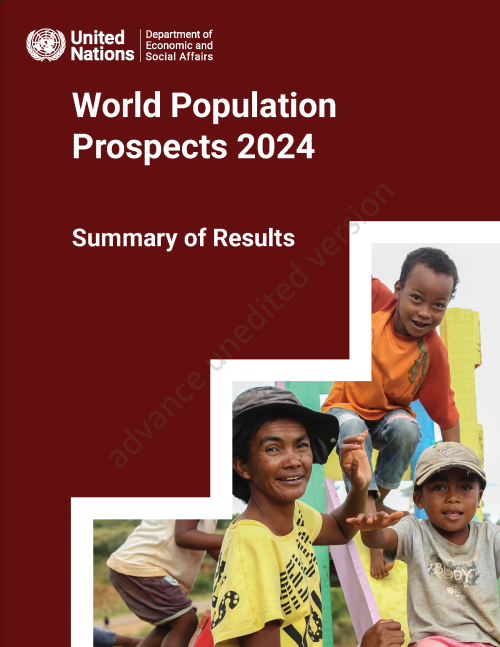Where will the Earth’s human population be in 2100? The United Nations has published the latest projections in a report entitled, World Population Prospects 2024. It predicts human population growth will peak at 10.3 billion by the mid-2080s. The current world population has reached 8.2 billion. In 2100, the report projects a world population of 10.2 billion. Highlights of the report include:
- In 63 countries population peaks have already been reached. Included in the list are China, Germany, Japan and Russia.
- In 48 countries representing 10% of the current world population, peaks will be reached between 2025 and 2054. Included in this group are Brazil, Iran, Tukey and Vietnam.
- In 126 countries, the population will grow and peak late in this century or early in the 22nd. These countries are India, Indonesia, Nigeria, Pakistan and the United States.
- The main driver of population growth in 88 of the 126 aforementioned countries is an age structure heavily weighted towards youth.
- The populations of countries in Sub-Saharan Africa are expected to grow by 38% by 2054. The trajectory of their growth is what will delay the beginning of a more rapid global decline late in this century and into the 22nd.
- More than half of the world’s countries have reached fertility rates below the replacement level of 2.1 live births.
- One-fifth of all countries have reached fertility rates of fewer than 1.4 live births.
- By the late 2030s, 50% of women in countries that have already peaked will be too old to have children by natural means indicating fertility rates will further decline.
- Average human longevity in 1995 reached 62.9. In 2024 it is 73.3. By 2054 longevity will average 77.4 years.
- In 1995, 17% of deaths occurred in people over the age of 80. By the late 2050s, more than half of all deaths will happen over 80.
- In the late 2070s, the number of people aged 65 or older will reach 2.2 billion, surpassing the number under the age of 18.
- By the mid-2030s, there will be 265 million people over 80 years of age which will be greater than the number 1 year of age or less.
- The main driver of population growth in 52 countries through 2054, and in 62 through 2100, will be immigration. These countries include Australia, Canada and the United States.
One thing is certain states this UN report. All populations are following a similar pattern regardless of what countries they inhabit. Family sizes are shrinking. It is just the rate of shrinkage that differs and is the determining factor in human population growth through the rest of this century and the beginning of its decline. The world’s population now is expected to be 700 million less in 2100 than what was anticipated ten years ago in a similar UN report.
What this signifies is an end to rapid human population growth that began in the 19th century with the Industrial Revolution in Europe and North America, and spread to the rest of the planet throughout the 20th.
What it also means is the beginning of a reduction in the environmental pressures that humans have put on the planet with progress towards a more sustainable future as food, water, housing, infrastructure and service demands get smaller.
Regarding climate change, population pressures will continue to exacerbate this human-created problem. Only one reference to the subject appears in the report summary. That’s on page 20 where it states that countries with populations that will remain close to their present size will benefit in efforts to:
- tackle poverty.
- improve health care and education.
- promote gender equality.
- improve social protection systems.
- create more sustainable patterns of production and consumption.
- protect the environment and mitigate the negative effects of climate change.
For those countries with natural population growth, and not fuelled by immigration, addressing climate change will likely be a lower priority even though ignoring its causes will prove disruptive to their economic and social stability.










[…] population will peak in the mid-2080s states the latest United Nations report. Today it is 8.2 billion. At peak, it will hit 10.3. Billions of young people may face […]